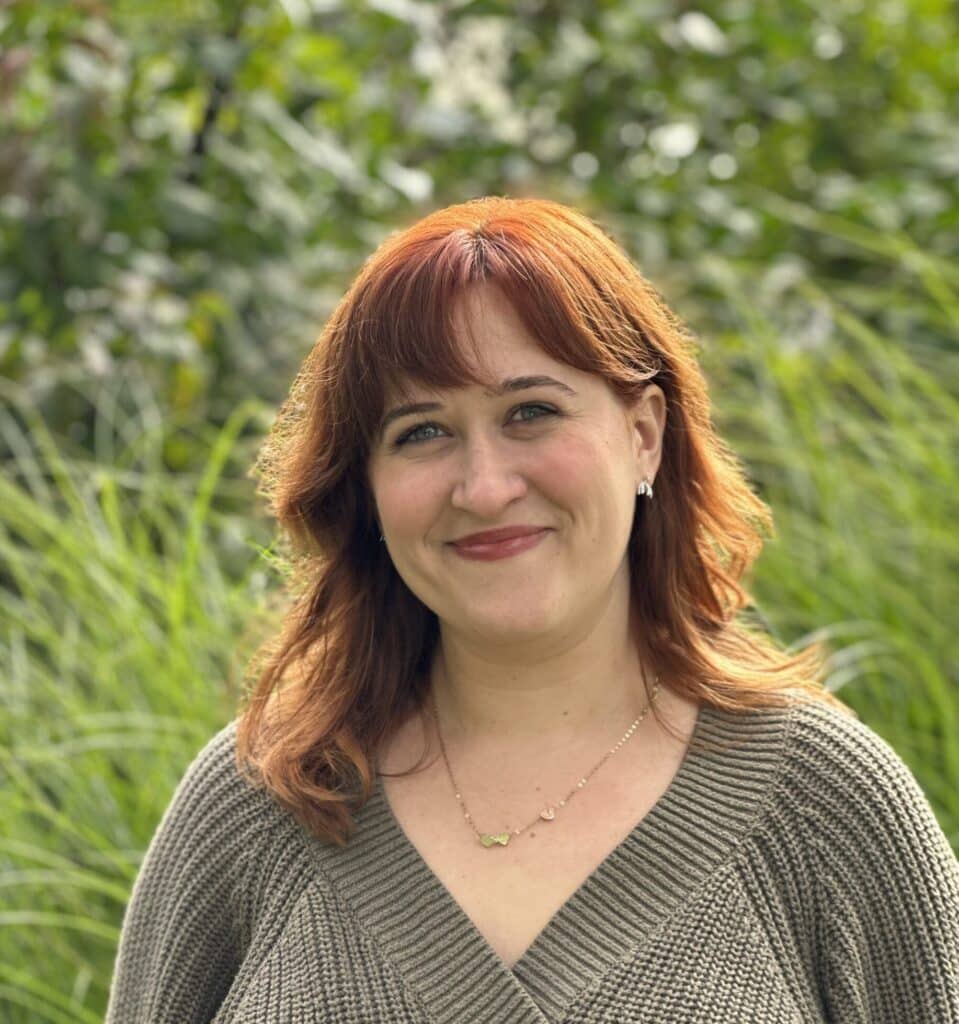Kayla is a psychotherapist at Wildflower. Among others, Kayla is passionate about working with queer and trans people, polyamorous individuals and relationships, kink and BDSM communities, and folks living life outside the religious traditions they were raised in. Kayla’s approach is warm, compassionate, and direct. Prior to her graduate studies, Kayla worked for several years in nonprofit administration, fundraising, and in adult sex education. She obtained her master’s degree in clinical social work from the University of Chicago Crown Family School of Social Work, Policy, and Practice. Read Kayla’s full bio here.
What inspired you to pursue a career as a psychotherapist?
The world is pretty terrifying sometimes! Like many others, noticing increasing political crises, racism and racial violence, legislative attacks on queer and trans folks, and extreme weather events and environmental destruction led me to questions about meaning, purpose, life, and death. All that combined with the pandemic and a well-timed reading of Octavia Butler’s Parable of the Sower led me to a question – What is my role in helping my community survive this real-life dystopia? The answer I found led me to pursue a career transition into psychotherapy.
As a psychotherapist, what part of your job is most satisfying?
Despite the suffering in the world, there can be so much joy and hope experienced through psychotherapy! I find deep meaning and satisfaction through witnessing people dream and take action towards greater authenticity and wholeness and through supporting relationships in co-creating their futures together despite few models or scripts.
How would you describe your therapeutic approach?
My therapeutic approach is warm, non-judgmental, and full of humor and laughter. I draw from evidence-based therapies and practices such as Internal Family Systems/Parts Work, Gottman Method, Acceptance & Commitment Therapy, Relational Psychodynamics, and Emotionally Focused Therapy to support folks navigating dissatisfying relationships and rocky terrain such as sexual dysfunction, opening up & practicing non-monogamy, exploring kink & BDSM, and forming family in non-traditional ways.
Why do you believe that psychotherapy can help?
Relationships – whether romantic, platonic, familial, or otherwise – are often the source of much distress, conflict, and painful emotions. But I also believe that it is through relationships, connection, and community that we heal, make peace with our suffering, and find security and belonging. I believe psychotherapy helps by providing a safe container in which to explore relationship patterns and dynamics; review and rewrite our relationship stories; and practice new relational skills like negotiation, boundary setting, and repair.
What are some of your specialties and what drew you to them?
I especially love working with individuals and partners/relationships who are navigating non-monogamy and polyamory; coping with jealousy and insecurity, negotiating relationship agreements; and unlearning mononormativity and relationship hierarchy. I also love working with couples and individuals around sex and intimacy concerns such as differing desires, low sexual interest, sexual boredom, and difficulty orgasming.
Prior to shifting careers into psychotherapy, I worked for several years in nonprofit administration, fundraising and philanthropy, and adult sex education. My time spent working with adults around increasing pleasure, playfulness, and sexual communication taught me so much about the significance of our relationships with our bodies and our sexuality and about the healing power of releasing sexual shame to live more authentically as our truest selves.
What is one thing about psychotherapy you wish everyone knew?
Psychotherapy is both a science and an art, which means it won’t look or feel the same way everywhere you go! If you’ve tried therapy or relationship counseling before and felt like it didn’t work for you or wasn’t helpful, but you’re still searching for solutions and support, I encourage you to keep looking for the right therapist for you. Finding the right fit matters and is much more likely to lead to effective therapy!
I also recommend checking out Wildflower’s Demystifying Psychotherapy series to learn more about giving therapy a try (or retry)!
What is your motto or personal mantra?
A Post-It note adorns my computer monitor with a constant, simple reminder – Right here, right now – to feel my feet on the floor, notice my breathing, and to be present with each new moment of day.
What are your favorite self-care activities?
My favorite forms of self-care involve repetitive tasks, lots of fidgeting, and often very little brain power! Decompressing after a long day generally looks like breaking out a jigsaw puzzle, working on a paint by number, practicing embroidery or crochet, reading a queer romance novel, or cleaning and doing the dishes while listening to a good podcast (my faves are Maintenance Phase, If Books Could Kill, Pod Save America, and Death Sex & Money).


